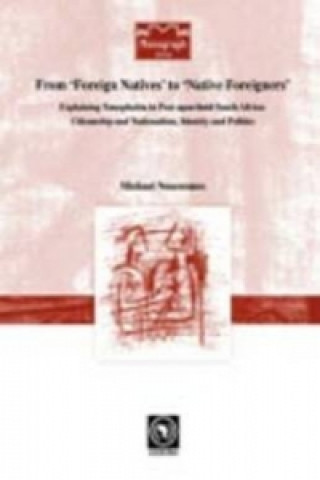
Kod: 08905649
From 'Foreign Natives' to 'Native Foreigners'. Explaining Xenophobia in Post-apartheid South Africa
Autor Michael Neocosmos
Xenophobia is a political discourse. As such, its historical development as well as the conditions of its existence must be elucidated in terms of the practices and prescriptions that structure the field of politics. In South Afri ... więcej
- Język:
 Angielski
Angielski - Oprawa: Miękka
- Liczba stron: 160
Wydawca: CODESRIA, 2008
- Więcej informacji o książce

Zobacz książki o podobnej tematyce
-

Dune
34.84 zł -33 % -

Haunting Adeline
125.81 zł -1 % -

Berserk Deluxe Volume 2
212.65 zł -1 % -

White Nights
15.30 zł -23 % -

Powerless
48.75 zł -11 % -

Atomic Habits
59.22 zł -26 % -

Dune Messiah
46.33 zł -3 % -

Berserk Deluxe Volume 3
218.19 zł -3 % -

One Day
32.63 zł -36 % -

Berserk Deluxe Volume 1
211.84 zł -2 % -

Iron Flame
61.14 zł -28 % -

Surrounded by Idiots
36.76 zł -28 % -

Harry Potter and the Prisoner of Azkaban (Minalima Edition)
170.44 zł -2 % -

Gravity Falls Journal 3
89.45 zł -

Heaven Official's Blessing: Tian Guan Ci Fu (Novel) Vol. 1
88.94 zł -1 % -

The Creative Act
100.22 zł -15 % -

Dune
47.34 zł -23 % -

Hunting Adeline
126.52 zł -4 % -

A Little Life
47.04 zł -14 % -

Children of Dune
46.73 zł -2 % -

Heaven Official's Blessing: Tian Guan Ci Fu (Novel) Vol. 2
77.76 zł -14 %
Powiadomienie o dostępności
Wpisz swój adres e-mail, aby otrzymać od nas powiadomienie,
gdy książka będzie dostępna. Proste, prawda?
Więcej informacji o From 'Foreign Natives' to 'Native Foreigners'. Explaining Xenophobia in Post-apartheid South Africa
 Opis
Opis
Xenophobia is a political discourse. As such, its historical development as well as the conditions of its existence must be elucidated in terms of the practices and prescriptions that structure the field of politics. In South Africa, its history is connected to the manner citizenship has been conceived and fought over during the past fifty years at least. Migrant labour was de-nationalised by the apartheid state, while African nationalism saw it as the very foundation of that oppressive system. However, only those who could show a family connection with the colonial/apartheid formation of South Africa could claim citizenship at liberation. Others were excluded and seen as unjustified claimants to national resources. Xenophobia's current conditions of existence are to be found in the politics of a post-apartheid nationalism were state prescriptions founded on indigeneity have been allowed to dominate uncontested in condition of passive citizenship. The de-politicisation of a population, which had been able to assert its agency during the 1980s, through a discourse of 'human rights' in particular, has contributed to this passivity. State liberal politics have remained largely unchallenged. As in other cases of post-colonial transition in Africa, the hegemony of xenophobic discourse, the book shows, is to be sought in the character of the state consensus. Only a rethinking of citizenship as an active political identity can re-institute political agency and hence begin to provide alternative prescriptions to the political consensus of state-induced exclusion.
 Szczegóły książki
Szczegóły książki
Kategoria Książki po angielsku Humanities History Regional & national history
- Pełny tytuł: From 'Foreign Natives' to 'Native Foreigners'. Explaining Xenophobia in Post-apartheid South Africa
- Autor: Michael Neocosmos
- Język:
 Angielski
Angielski - Oprawa: Miękka
- Liczba stron: 160
- EAN: 9782869782006
- ISBN: 9782869782006
- ID: 08905649
- Wydawca: CODESRIA
- Waga: 228 g
- Wymiary: 215 × 142 × 10 mm
- Data wydania: 20. August 2008
zadowolonych klientów
Od roku 2008 obsłużyliśmy wielu miłośników książek, ale dla nas każdy był tym wyjątkowym.
Copyright! ©2008-24 libristo.pl Wszelkie prawa zastrzeżonePrywatnieCookies



 21 milionów książek
21 milionów książek Dostawa 10.99 zł
Dostawa 10.99 zł (32) 444 93 66 (8-15.30h)
(32) 444 93 66 (8-15.30h)